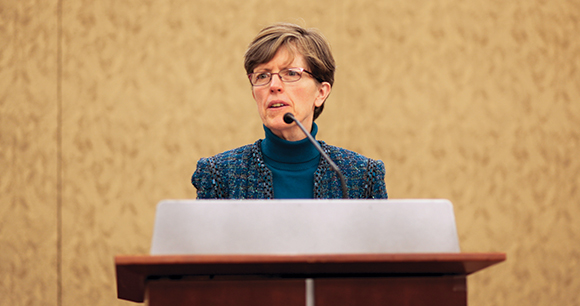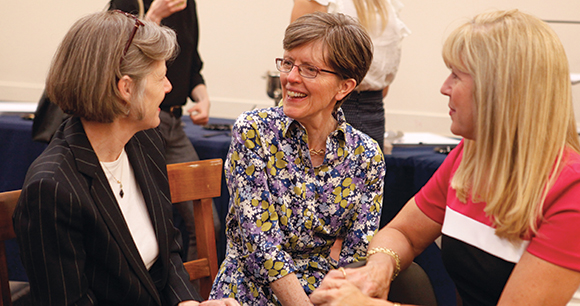On any given day, you’ll find Nancy Blaney, AWI’s director of government affairs, sprinting through the halls of Congress, camped out at a committee hearing, and/or intercepting a potential ally at a reception to bend an ear. It’s never been an easy job. Early in her career, Nancy traveled to her home state of Pennsylvania to testify at a state House committee hearing in support of an exotic pet ban. After addressing the serious animal welfare and public safety concerns with keeping tigers and chimpanzees in private homes, Nancy decided to go off script. She urged the state to also ban barbaric steel-jaw leghold traps, which threaten wildlife, humans, and pets. “Well, little lady,” bristled the chairman, “you were doing fine up until then.”

A voice for the vulnerable
Growing up in Bucks County, Pennsylvania, Nancy was, in her telling, “always one for rescuing something—usually things that really didn’t need to be rescued.” While attending an all-girl Catholic high school, she refused to dissect a crayfish—an uncommon moral position in the late 1960s—explaining that it was unnecessary “at the high school level to require that animals be taken apart.”
After studying government and politics at the University of Maryland, Nancy arrived on Capitol Hill in 1977 as the first woman to work in the US House of Representatives documents room, where she typed up bill summaries on index cards. Following that, she was a legislative assistant for Rep. Allen Ertel (D-PA). Nancy would go on to assume various roles at major animal protection organizations, including documenting animal mistreatment at roadside zoos for the Humane Society of the United States, advocating protections for captive elephants on behalf of the Performing Animal Welfare Society, and overseeing national legislative affairs for the ASPCA. In 2007, she joined the staff at AWI.
While consulting for the Doris Day Animal League, Nancy (an avowed grammar nerd) pointed out a drafting error in the 2002 Helms Amendment to the Animal Welfare Act (AWA). The amendment had intended to exclude from the law’s protections rats and mice used in research, as well as all birds. However, due to an errant comma in the final, enacted legislation, birds in the pet trade had not been excluded. “We had a meeting at the US Department of Agriculture where I brought this up,” Nancy recalls. “You could see them blanche.” Eventually, the USDA issued regulations outlining AWA protections for these birds. (See AWI Quarterly, spring 2023.)
AWA coverage and enforcement, in fact, has long been a thorn in Nancy’s paw. She once told a meeting of USDA administrators that the department “treats license holders as if they are the clients. They’re not. This is the Animal Welfare Act, not the License Holder Welfare Act.” The Animal Welfare Enforcement Improvement Act, a bill AWI supports, would end the USDA’s practice of issuing licenses to dealers and exhibitors who chronically fail to comply with the law’s minimum welfare standards.

Nancy currently co-chairs the Animal Cruelty Advisory Committee of the Association of Prosecuting Attorneys and serves on several other law enforcement advisory boards. Since 2009, she has helped shape AWI’s efforts to educate a multitude of prosecutors, police officers, veterinarians, social workers, and others on the link between animal cruelty and a host of crimes involving interpersonal violence.
As a result, AWI has successfully fought for millions of dollars in federal grants to bolster shelter options for domestic violence survivors seeking safety for themselves and their pets and has created state-specific manuals to guide advocates and attorneys in how to include pets in domestic violence protection order.
Navigating a politically fractured climate
A self-described “belt-and-suspenders gal,” Nancy believes in pursuing more than one political path to achieve AWI’s objectives. Although animal-friendly legislation often attracts bipartisan support, enacting strong standalone bills can prove difficult amid competing priorities. Occasionally, her team and their allies will secure a major standalone win, such as the 2022 Big Cat Public Safety Act, which ended the dangerous trade in pet big cats. Far more often, however, they will persuade lawmakers to insert language into existing appropriations or other priority bills to achieve important aims, such as AWI’s success in getting language added to withhold funding for the licensing of “Class B” dealers who acquire cats and dog from random sources and sell them to labs for experimentation—a measure that effectively shuts these historically shady dealers down.
“If you’re measuring progress only by standalone bills getting passed, you’re not seeing the big picture,” says Nancy. “All of this is education and raising awareness and an imperceptible change in thinking. It’s a vastly different place from when I started.” Much of the work today, sadly, also involves defending long-standing animal protection laws from unprecedented attacks. “Advocacy work can be distressing, humbling, and discouraging,” observes Kate Dylewsky, assistant director of government affairs at AWI, “but Nancy has the remarkable ability to regroup after every setback and never give up.”
Nancy and her husband share space at their Virginia home with rescue cats Earl and Julius, “frenemies” who have yet to destroy her vast collection of Wedgwood china. “After all these years, I have found that wrangling cats at home is good practice for all the wrangling that goes into my job!”